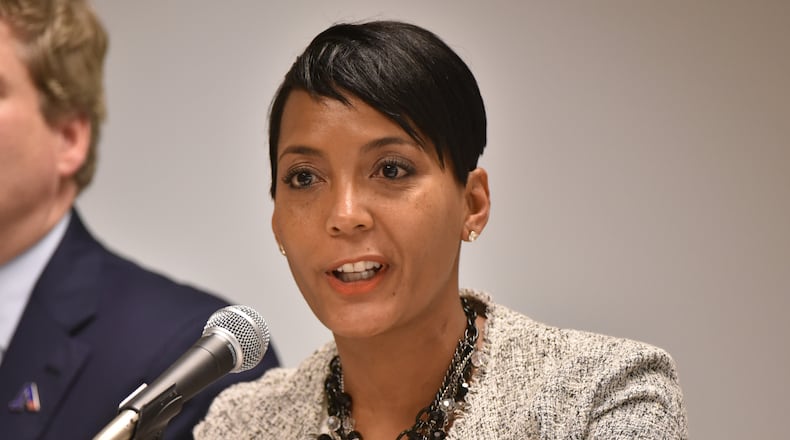If campaign seasons had names, this one might be called the Age of the Dysfunctional Parent.
One of the most parodied clichés of political campaigns is the origin story. Virtuous fathers and mothers are often involved. They swim oceans and climb out of slums. Sometimes they slug their way into board rooms or law school.
Even if the candidate has already achieved a measure of success, humble and hardworking parentage is proof that his or her grit is genetically guaranteed.
And yet in the last few months, Georgia has seen three candidates – all women – turn this trope on its head. They got where they are not because of a parent, but despite him. Or her.
Their campaigns, like their life stories, are built on sabotaged childhoods.
Stacey Evans, a Democratic candidate for governor, launched her campaign in June with a biographic video that told of her north Georgia birth to a single mother who never finished high school, then struggled in several marriages, all the while moving her daughter in and out of 16 homes. Most of them trailers.
Last month, Keisha Lance Bottoms, a candidate for mayor of Atlanta, posted her own YouTube bio-flick. "I learned very early on that good people sometimes make bad decisions," she says in the video. When she was 8 years old, Bottom arrived from school to find police officers at her home and her father in handcuffs, charged with cocaine distribution.
Bottoms would spend three years of weekends visiting her father in prisons across Georgia. “When you are a child, that’s a lifetime,” she would say later.
Both Evans and Bottoms were preceded by Karen Handel, the Republican victor in this summer’s hard-fought race for the Sixth District congressional seat.
The outline of Handel’s hardscrabble youth had been sketched in previous campaigns. She left her Maryland home at age 17, before finishing high school, after her alcoholic mother pulled a pistol on her. Disclosure by Handel was nearly required — in particular, to help explain her lack of a college degree.
But it’s fair to say that during her contest against Democrat Jon Ossoff in a three-month runoff, Handel put more emphasis on her shipwrecked childhood than she ever had before.
"That makes a person not only strong and tough, but also resilient and empathetic about other folks who are going through their own challenges," Handel said in one ad.
One does not throw a parent under the bus willy-nilly. Sometimes conversations happen.
In an Ozy.com article published last month, Evan's mother, Kim Godfrey, described the discussion of whether to go public with a messy family life as "a lot of crying, a lot of yelling." Eventually, Godfrey gave permission to the daughter who would be governor: "Tell your story."
In the case of Bottoms, the mayoral candidate, the decision was unilateral.
“I didn’t run it by anybody,” she said. “I asked my mom not long ago about what my dad might think about me talking about it. Because we didn’t talk about it, even in my family. She said, ‘He was such a private person. But you’ve put it out there now, so it’s too late.’”
There is no rancor there. Bottoms and her mom, Sylvia Robinson, are close. She comes to the Bottoms house at 6:30 a.m. every morning, to fix breakfast for her grandkids and see them off to school.
If childhood was a long, wintry slog for Evans and Handel, adolescence for Bottoms was something of a car crash.
Major Lance was a boxer-turned-dancer-turned singer with a sweet, sweet voice. He came out of the Chicago soul machine, achieving a notable level of success in the '60s. He opened for the Beatles on their first U.S. tour in 1964. In a photo of the group's return to Britain, Paul McCartney can be seen stepping out of the plane with a Major Lance album under his right arm.
“He was a big deal, and my life as a child revolved around him being a big deal,” Bottoms said. Britain loved him, and the Lance family even lived in London for a time.
But then the records stopped selling and the gigs stopped happening. The bank took the Collier Heights house. The cops came in 1978. “This extraordinary life of traveling and going to ballet and all the things that were fun, and all the things you do as a family — my dad coaching Little League, a stay-at-home mom — it all changed in an instant,” Bottoms said.
When dad left for prison, mom went in search of minimum wage jobs – in St. John suits. When fourth grade arrived for Bottoms, a bit of academic success was celebrated at Piccadilly Cafeteria. Mom scraped off the plates and put them in her purse to take home. They didn't have dishes at home.
It’s funny now, but probably wasn’t so much then.
Major Lance died in 1994 at age 55. Only after a group of eccentric-looking white men left the memorial service in Atlanta did Bottoms realize that one of them was Elton John.
It’s easy enough to see that biography and parenting, good or bad, are inseparable. What’s changed is what gets hung out on a public clothesline for all to see.
Andra Gillespie, an Emory University political scientist who is roughly the same age as these candidates, detects something generational. “We are the latch-key kids. These are very extreme cases of kids having to fend for themselves in some way,” she said. “But I think it more fits the political urge to make one appear relatable.”
Gillespie introduced an old man to a Jennifer Lopez lyric: “Don’t be fooled by the rocks that I got…I’m still Jenny from the block.”
And she pointed out that Evans, Bottoms and Handel have left some niceties preserved. “They’re not talking about the nuclear families they’ve created. They’re talking about the families they’ve emerged from,” Gillespie said.
I’ll buy into that, but would add more. Political taboos have shifted before. Once upon a time, personal bankruptcy was a death knell in politics. If one couldn’t handle one’s personal finances, one couldn’t be trusted with public money. Then came the Great Recession, and in many quarters, bankruptcy became a political asset — proof that one truly understood the economic disaster that had fallen on all of us.
In the United States, marriage is on the rocks – particularly among working-class Americans. Families are disintegrating faster than ever before. The burdens of these implosions are born primarily by women. Evans, Bottoms and Handel have decided that dysfunctional parents who might have once been considered an embarrassment are now common enough to be a badge of solidarity.
About the Author
The Latest
Featured




